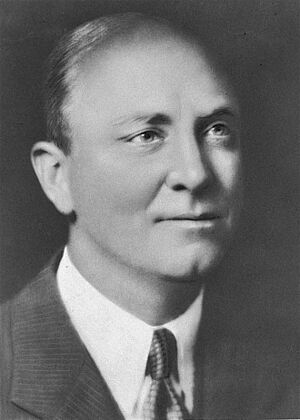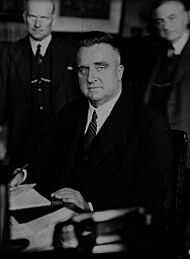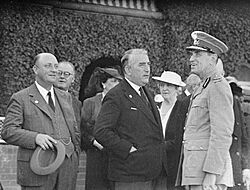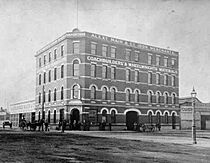Alexander Mair facts for kids
Quick facts for kids
Alexander Mair
|
|
|---|---|

Mair as Premier in 1940.
|
|
| 26th Premier of New South Wales Elections: 1941 |
|
| In office 5 August 1939 – 16 May 1941 |
|
| Monarch | George VI |
| Governor | Lord Wakehurst |
| Deputy | Michael Bruxner |
| Preceded by | Bertram Stevens |
| Succeeded by | William McKell |
| Colonial Treasurer of New South Wales | |
| In office 13 October 1938 – 16 August 1939 |
|
| Preceded by | Bertram Stevens |
| Succeeded by | Athol Richardson |
| Member of the New South Wales Parliament for Albury |
|
| In office 11 June 1932 – 14 August 1946 |
|
| Preceded by | Joseph Fitzgerald |
| Succeeded by | John Hurley |
| Personal details | |
| Born | 25 August 1889 Melbourne, Victoria |
| Died | 3 August 1969 (aged 79) Melbourne, Victoria, Australia |
| Political party | United Australia Party Democratic Party Liberal Party |
| Spouse | Grace Lennox |
| Children | 3 |
| Profession | Politician |
Alexander Mair (born 25 August 1889, died 3 August 1969) was an important Australian politician. He served as the Premier of New South Wales from August 1939 to May 1941. A Premier is like the leader of a state government.
Mair was born in Melbourne. He worked in different businesses before moving to Albury, New South Wales. There, he became a member of the New South Wales Legislative Assembly, which is like the state parliament. He was elected for the area of Albury in 1932 and won four more elections.
He quickly moved up in the government led by Bertram Stevens. Mair became an Assistant Minister in 1938. Soon after, he was made Minister for Labour and Industry. By October 1938, he became the state's Treasurer.
Mair strongly supported Premier Stevens. He became Premier himself in August 1939. This happened after Stevens lost a "no-confidence motion." This is a vote where politicians show they no longer support their leader. Mair became Premier during a difficult time. He helped unite his political party and worked to reduce government debt. He also introduced new laws to help with unemployment. When World War II started in September 1939, Mair helped prepare New South Wales for the war effort. He lost the state election in May 1941 to the Labor Party.
After losing the election, Mair became the leader of the opposition. He helped bring together different conservative parties. These parties later formed the Liberal Party in 1945. Mair led the Liberal Party in New South Wales for a short time. He then retired from state politics in 1946 to try for a seat in the Australian Senate. He was not successful and moved back to Melbourne. He passed away in 1969 at the age of 79.
Contents
Early Life and Business
Alexander Mair was born on 25 August 1889. His birthplace was North Carlton, a suburb of Melbourne, Victoria. He was the oldest child of Alexander Mair, who was a timber and steel merchant, and Florence Mair.
Mair went to Wesley College where he was good at sports. He also studied at Bradshaw's Business College. After school, he worked for his father's company, Alexander Mair & Co. This company sold timber, iron, and steel.
In 1913, Mair married Grace Lennox. They had two sons, John and Sandy, and one daughter, Margaret. When his father died that same year, Mair took over the family business. He expanded the company to include hardware. He traveled a lot to meet suppliers from other countries.
However, Mair became ill with the flu in 1919. This led to asthma, and he slowly stopped working in the business. In 1922, he sold the steelyard part of the company. By 1925, he sold the rest of the company's assets. He then became a director for the new company until 1927. In 1928, Mair bought a farm called 'Rockwood' near Albury, New South Wales. On this farm, the Mairs raised sheep and cattle and grew grain.
Starting in Politics
Mair first entered politics in the state election on 11 June 1932. He ran as a candidate for the United Australia Party. He aimed to win the local seat of Albury in the New South Wales Legislative Assembly.
This election happened soon after Premier Jack Lang was removed from office. There was some violence during the election campaign. Despite this, Mair won the seat from the Labor Party member, Joseph Fitzgerald.
As a local politician, Mair wanted to help people affected by the Great Depression. He kept a promise he made during his campaign. He gave most of his parliamentary salary to help the poor in his area. He continued this until 1938.
Mair was a strong supporter of Premier Bertram Stevens. He was known for being loyal but also independent. He was also a powerful speaker in parliament. In the May 1935 election, Mair won his seat again with even more votes. In 1937, he visited Britain with his wife for the coronation of King George VI.
Becoming a Minister

In the March 1938 election, Mair was re-elected. On 13 April 1938, Premier Stevens appointed Mair as an Assistant Minister. He held this role for ten weeks. On 1 June 1938, he was promoted to Minister for Labour and Industry.
Even though he was in this role for a short time, Mair was very successful. He gained a reputation for understanding workers' issues. He helped solve several disagreements between workers and businesses.
On 13 October, Premier Stevens promoted him again. Mair became the Colonial Treasurer. As Treasurer, Mair immediately suggested big cuts in spending. He wanted to balance the budget and find new ways to collect taxes. He asked all government ministers to get approval for any spending over £3000.
However, the Deputy Leader, Eric Spooner, did not follow this rule. Spooner wanted to make Stevens' leadership look bad. In July 1939, Stevens and Mair tried to stop Spooner's actions. They created a committee to approve all spending. Spooner was angry and resigned on 21 July 1939. He said it was because of a "disagreement in government policy."
On 1 August 1939, Spooner called for a "no-confidence motion" against Stevens. This motion surprisingly passed. On 3 August, Stevens resigned as Premier. A new leader needed to be chosen.
Spooner was considered as the next Premier. But the Country Party leader, Michael Bruxner, refused to work with him. Stevens tried to get support for Mair. At a party meeting on 5 August, Spooner decided not to run. Mair won the vote and became the leader of the United Australia Party. He was sworn in as Premier on the same day.
Premier of New South Wales
Mair became Premier during a difficult time. The government was not working well, and the state's finances were getting worse. Mair quickly worked to unite his party. He held regular party meetings and listened to everyone. This helped bring his party together. This unity became a key feature of Mair's time as Premier.
Mair focused on several important changes. He tried to fix the economy by raising taxes. He also made sure that some of the money from taxes went to help with unemployment and social support. He also made changes to laws about landlords and tenants. He helped country racing clubs and improved health and safety in coal mines. Mair remained loyal to the former Premier, Bertram Stevens. He said that what he learned from Stevens would help New South Wales.

Mair changed many of the ministers in his government on 16 August. Athol Richardson became the new Treasurer. Lewis Martin took over Spooner's old roles. Vernon Treatt became the Minister for Justice.
At this time, 53,000 people were registered as unemployed. On 30 August, Mair made plans to help young people find jobs. He also offered good retirement plans for coal miners. He made retirement at age 60 compulsory. These actions helped to cut the unemployment rate in half.
On 3 September 1939, World War II began. Mair's two sons had already joined the military. The next day, Mair confirmed that New South Wales would support Britain and its allies. Mair himself contributed £4000 to war loans. In December, Mair's government refused to register German refugee doctors. Mair also criticized Prime Minister Robert Menzies for not putting enemy aliens in special camps.
In March 1940, the leader of the opposition, William McKell, criticized Mair's government. He said it was not doing enough about unemployment and housing. Mair gave a long speech defending his government.
Mair's choice of Justice Minister, Vernon Treatt, caused problems. It was claimed that Treatt had reduced fines for companies that sold bad bread to the Defence Department. Even though an official investigation cleared Treatt, public trust in Mair's government went down.
In the campaign for the election on 10 May 1941, Mair did not do well. He found it hard to show how he was different from the previous Premier. He also promised action only after the war. McKell's Labor Party, however, promised immediate changes. In the election, the Labor Party won more than half the votes. Mair's party lost twenty seats. Mair himself kept his seat. The conservative parties would not win government again until 1965.
Later Political Life
In Opposition
After the election loss, Mair became the Leader of the Opposition on 19 May 1941. He promised to fully support the government in war matters. However, the United Australia Party fell apart after a poor result in the 1943 federal election.
Many former members of Mair's party formed the Democratic Party in New South Wales, led by Mair. Other members joined different parties. The Democratic Party later merged with another party in January 1944. With the conservative vote split, Mair had little chance of winning. He resigned as Democratic Party Leader on 10 February 1944. Reginald Weaver became the new leader, and Mair became his deputy.
Weaver and Mair led the divided conservative parties to another defeat in the May 1944 election. They lost three more seats. This was Mair's last state election, and he kept his seat.
After this election loss, Mair played a big role in uniting the conservative parties. They came together to form Robert Menzies' new Liberal Party in 1945. Mair was part of the Liberal Party's executive in New South Wales. When the first party leader, Weaver, died in November 1945, Mair was chosen to take his place.
Mair served as the second Leader of the New South Wales Liberal Party for a short time. He resigned on 21 March 1946. His former Justice Minister, Vernon Treatt, took over as leader. On 14 August 1946, after 14 years in the New South Wales Parliament, Mair resigned his seat. He wanted to run for a spot in the Australian Senate for New South Wales. In the federal election on 28 September 1946, the Liberal Party lost. They did not win any Senate seats in New South Wales.
After Politics
Mair then retired from politics and returned to his farm in Albury. He saw his old seat lost to the Labor Party in a special election. However, Mair later helped the Liberal Party win his old seat back in the May 1947 election. In 1948, he sold his farm.
In 1949, Mair moved back to Melbourne. He took on various business and community roles. He became a board member of the Melbourne Dental Hospital. He was also a national councilor for the Young Men's Christian Association (YMCA). He served as vice-president for the Royal Victorian Institute for the Blind and Guide Dogs for the Blind.
On 12 January 1949, King George VI allowed Mair to keep the title "The Honourable" for life. This was because he had served for more than three years on the Executive Council of New South Wales.
Alexander Mair passed away on 3 August 1969 at his home in St Kilda. He was 79 years old. He was survived by his wife, two sons, and daughter.
Images for kids
 | Janet Taylor Pickett |
 | Synthia Saint James |
 | Howardena Pindell |
 | Faith Ringgold |



